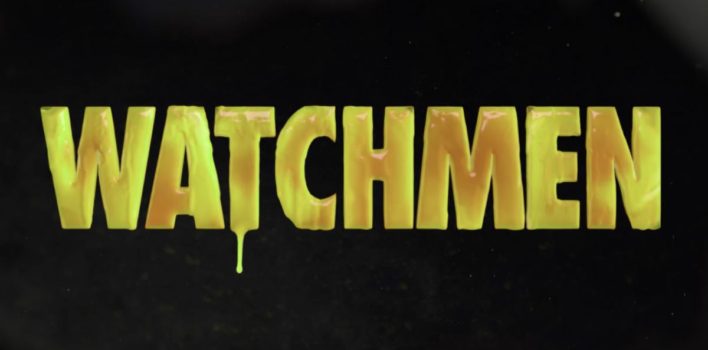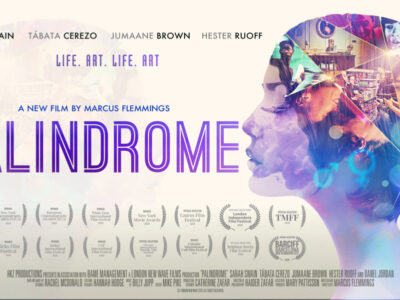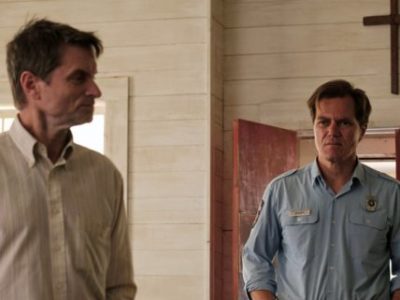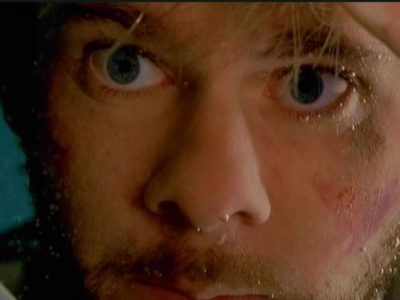Watchmen (2019): Full Series Review
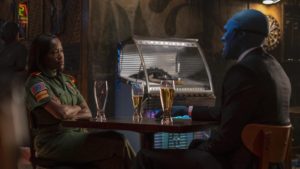 During the first half of the series, it would not have been odd for a viewer to assume the crux of the series’ narrative would rely mostly on the characters of Sister Night, Looking Glass, and Laurie Blake as they maneuver within the milieu of Tulsa race relations in this alternate universe; all while Adrian Veidt and Doctor Manhattan remain ever-present spectres in the story. However, the final two episodes of the show takes a hard turn towards the hyper-philosophical underpinnings of these original Watchmen as we start to see where Alan Moore and Damon Lindelof’s visions collide.
During the first half of the series, it would not have been odd for a viewer to assume the crux of the series’ narrative would rely mostly on the characters of Sister Night, Looking Glass, and Laurie Blake as they maneuver within the milieu of Tulsa race relations in this alternate universe; all while Adrian Veidt and Doctor Manhattan remain ever-present spectres in the story. However, the final two episodes of the show takes a hard turn towards the hyper-philosophical underpinnings of these original Watchmen as we start to see where Alan Moore and Damon Lindelof’s visions collide.
We learn that Angela Abar (Regina King), Sister Night, knew of Manhattan’s true location the whole time: in the body of Cal—her husband of 10 years and father to their adopted children. Ten years prior, she and Manhattan (Yahya Abdul-Mateen II) began a relationship in Vietnam which came under stress due to Manhattan’s ability to be in various timelines at the same time—an element of the Judeo-Christian God. Adrian Veidt (Jeremy Irons), Ozymandias, gives Manhattan an implant that can erase his memories and dull his “god-ness” so he can be more human. Angela places it in his head before they move to Tulsa, Oklahoma, and when we see Angela place a hammer in the side of Carl’s head at the end of episode seven, ten years later, we realize that she had to remove the implant in order for Manhattan to become himself once again, so he can avoid capture and possible death.
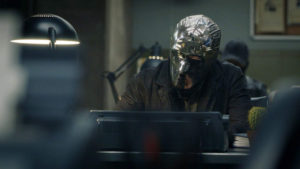 All the while, Ozymandias finds himself rescued from his mansion prison and brought back to Tulsa by Lady Trieu (Hong Chau). By the final episode, we see how each party in the show was playing the other parties to retain control of Manhattan’s powers along with the world’s economic and political power. Senator Joe Keene Jr., along with Judd Crawford, are at the helm of the Seventh Kavalry—the white supremacist movement that hides their identity with Rorshach masks—and sought to find Manhattan, capture him, and transfer his powers. Lady Trieu was using the Seventh Kavalry’s plan to capture Manhattan to her advantage in order to do the same thing. Will Reeves (Louis Gossett Jr.) turns out to have been working with Manhattan the whole time by subverting Lady Trieu’s plan. Manhattan knows that reuniting Angela with her grandfather would be the best-case scenario in the face of his inevitable end—at least as the final episode implies.
All the while, Ozymandias finds himself rescued from his mansion prison and brought back to Tulsa by Lady Trieu (Hong Chau). By the final episode, we see how each party in the show was playing the other parties to retain control of Manhattan’s powers along with the world’s economic and political power. Senator Joe Keene Jr., along with Judd Crawford, are at the helm of the Seventh Kavalry—the white supremacist movement that hides their identity with Rorshach masks—and sought to find Manhattan, capture him, and transfer his powers. Lady Trieu was using the Seventh Kavalry’s plan to capture Manhattan to her advantage in order to do the same thing. Will Reeves (Louis Gossett Jr.) turns out to have been working with Manhattan the whole time by subverting Lady Trieu’s plan. Manhattan knows that reuniting Angela with her grandfather would be the best-case scenario in the face of his inevitable end—at least as the final episode implies.
All of the cards fall in place as Angela locks her family in her superhero lair and discovers one unbroken egg in the carton of eggs that she had smashed in her final discussion with Manhattan. She recalls an earlier conversation they had about his ability to put his powers in an organic entity like an egg, giving the one who ate it could his powers. She eats the egg and steps out onto the pool before the show cuts to black. Its ambiguity is similar to the spinning, but slowly toppling, top in Inception. How one reads the ending is dependent on how you read what the rest of the show tells you. It would make sense for Manhattan to leave the egg with his powers behind for Angela to find and utilize, but it seems plausible that Manhattan would not necessarily want to put a target on Angela’s back for any forthcoming powers that would want to control her.
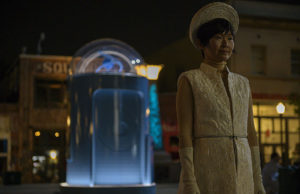 Perhaps the most impressive element of the series was its ability to shift the narrative of the Watchmen graphic novel from the anti-hero Ozymandias—who is ultimately brought back to be prosecuted by Laurie Blake (Jean Smart) and Looking Glass (Tim Blake Nelson) at the end of the series—to the more systemic threat of Cyclops, the overarching power brokers behind the Seventh Kavalry. Manhattan recognizes that this is no longer his fight, but rather must be the fight for someone more equipped at battling systemic evil; whose whole life has been that very battle. Someone like Angela, who had been betrayed by a white police chief (and his wife) whom she thought were her friends, a faceless white supremacy collective headed by a white senator who mouthed words of wokeness throughout the series, and corporate interests that used any means of subterfuge to increase their own power and profit. It would make sense, then, for Manhattan to pass his powers to Angela, descendant of Will Reeves, a masked vigilante in his own right and survivor of the Tulsa Race Massacre, to take on this multifaceted evil with tentacles reaching into every aspect of life; not just a singular superhero villain like Ozymandias or Lex Luthor or Joker.
Perhaps the most impressive element of the series was its ability to shift the narrative of the Watchmen graphic novel from the anti-hero Ozymandias—who is ultimately brought back to be prosecuted by Laurie Blake (Jean Smart) and Looking Glass (Tim Blake Nelson) at the end of the series—to the more systemic threat of Cyclops, the overarching power brokers behind the Seventh Kavalry. Manhattan recognizes that this is no longer his fight, but rather must be the fight for someone more equipped at battling systemic evil; whose whole life has been that very battle. Someone like Angela, who had been betrayed by a white police chief (and his wife) whom she thought were her friends, a faceless white supremacy collective headed by a white senator who mouthed words of wokeness throughout the series, and corporate interests that used any means of subterfuge to increase their own power and profit. It would make sense, then, for Manhattan to pass his powers to Angela, descendant of Will Reeves, a masked vigilante in his own right and survivor of the Tulsa Race Massacre, to take on this multifaceted evil with tentacles reaching into every aspect of life; not just a singular superhero villain like Ozymandias or Lex Luthor or Joker.
The reality of the Watchmen television series is a hyper-exaggerated version of our own reality, one that calls for another type of hero with new responsibilities to call out the failures of those in power and the ways their actions and money trickle down through pre-ordained channels made by the majority and privileged in the world. This is why Angela and Will are so adept at recognizing how power and evil move in this ever-evolving culture and society. Not only are there bad individuals, but their choices make even good people complicit in their bad choices. The root system is decayed and individualism has ruled as a metric long enough that we now need those who know how those roots burden and crack the very foundations that our world sits on.
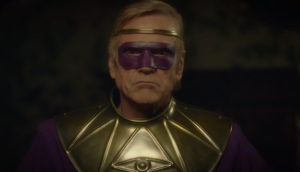 Lindelof has succeeded in telling a compelling story that largely keeps its focus and rides the razor’s edge at all times. This story could have gone off the rails in so many ways and at so many times, but it is clear that the writers, directors and producers involved made a concerted effort to construct a tight narrative with a satisfying ending, albeit not necessarily a “happy” ending because as Manhattan says, nothing ever ends. While I appreciate the way the show finds a way to give Angela and her grandfather a chance to connect—through the drug, Nostalgia, and Manhattan’s plan—it doesn’t feel like the strong race themes running through the show ended on a strong note. The sentimental note felt a bit too simple especially within the complexities of the rest of the series. There is a world in which the Tulsa story could have been bookended better at the end in order to match the tension and depth of meaning in the opening scene of the first episode. That is a rather small gripe for a show that surpassed nearly everyone’s expectations for its scope, vision, and thematic depth. While I would be open to more stellar story-telling from Lindelof and crew, I perhaps would be happier if they left it alone.
Lindelof has succeeded in telling a compelling story that largely keeps its focus and rides the razor’s edge at all times. This story could have gone off the rails in so many ways and at so many times, but it is clear that the writers, directors and producers involved made a concerted effort to construct a tight narrative with a satisfying ending, albeit not necessarily a “happy” ending because as Manhattan says, nothing ever ends. While I appreciate the way the show finds a way to give Angela and her grandfather a chance to connect—through the drug, Nostalgia, and Manhattan’s plan—it doesn’t feel like the strong race themes running through the show ended on a strong note. The sentimental note felt a bit too simple especially within the complexities of the rest of the series. There is a world in which the Tulsa story could have been bookended better at the end in order to match the tension and depth of meaning in the opening scene of the first episode. That is a rather small gripe for a show that surpassed nearly everyone’s expectations for its scope, vision, and thematic depth. While I would be open to more stellar story-telling from Lindelof and crew, I perhaps would be happier if they left it alone.


